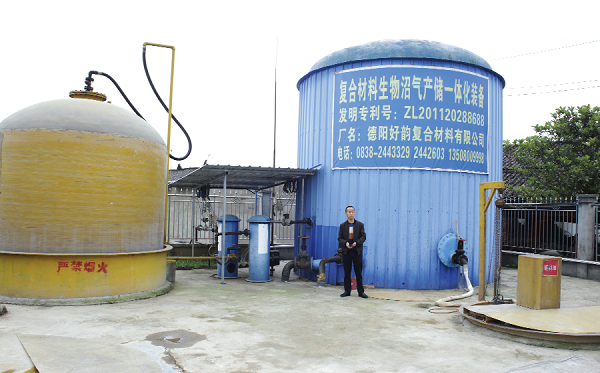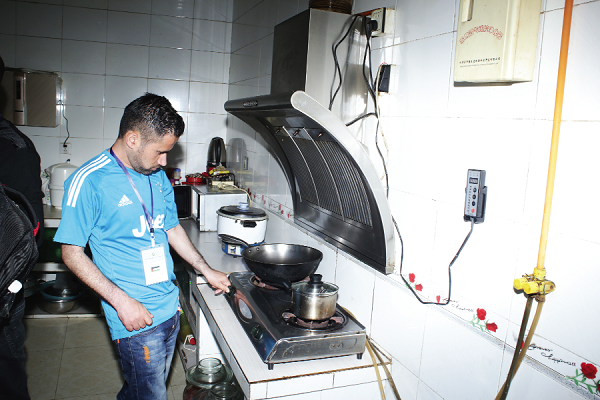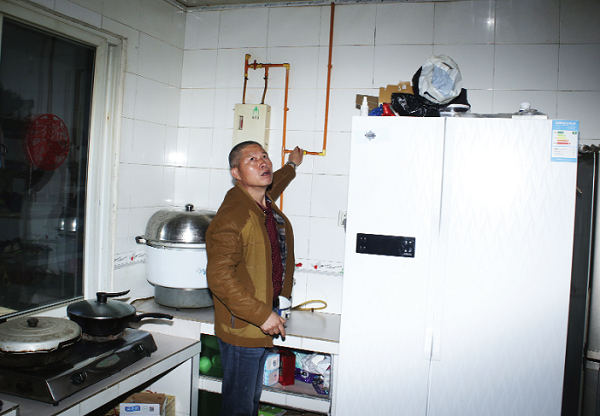
Backyard biogas in China - A low-tech fuel with a big payoff for Ghana
I was in the heart of rural Sichuan in China, sitting in the kitchen of a peasant farmer at the Yongan Town of Shuangliu County.
I watched a young man while he lit a burner on a bio gas stove attached to a rubber tube which was inserted into a biogas unit to prepare breakfast for me and his father, Mr Xianjun Luo.
After the breakfast, I was led behind the house, where Mr Luo pointed to a concrete lid in the ground with a plastic tube emerging from it and leading through the wall of their kitchen.
Under that lid was an airtight pit called the digester, where organic waste was fermenting and creating biogas which was piped into the house through the plastic tube.
Next to the house was the family pigsty, containing five very clean pink pigs snorting and snuffling; their manure and urine were washed down through a gutter that slanted directly into the underground biogas digester.
The pigs’ excreta was mixed with vegetable waste such as straw or plant stalks, with enough liquid slurry to create a protective airtight cover, under which microbes worked to ferment the mixture and produce biogas.

A co-operative household biogas plant with digester at Shuangliu County
“We have improved our environment and improved our health with the biogas production,” Mr Luo said. By producing and using biogas in our homes”, we no longer have to burn charcoal or kerosene for cooking, and the trees need not be cut for firewood,” he added.
“There is no smoke in my house anymore and I get fertiliser to grow my vegetables; the excreta from the five pigs supplies the daily household gas for family use,” he added.
Biogas for eco-economy

A young man lighting the biogas stove for cooking
Not only does this system produce a clean, odourless, smokeless fuel, it also provides an organic fertiliser with high nitrogen and phosphorus content.
A few years ago, residents of the Shuangliu County and several villages in China faced the problem of power cuts, but now some progressive farmers of Yongan Town, Shilin County and Dugiangyan villages have come together to form co-operatives to install biogas plants, thereby generating electricity for both domestic and agricultural purposes.
In several provinces across China, both household-run operations and industrial-scale facilities are using centuries-old technology to extract a fuel known as biogas from crop waste, manure, kitchen scraps and even sewage.
China generates as much electricity as two nuclear power plants, with the gas produced by decaying plant matter and animal slurry.
The country has sufficient raw material resources for the production of biogas, but only the agricultural waste is being converted into energy, which is equivalent to 500 million tons of standard coal and 350 million tons of crude oil (about 2.5 billion barrels).
The Chinese government has strongly supported the development of bio-energy and has launched preferential policies for biomass energy producers, including tax breaks and direct subsidies to the products.
Biogas and animal manure

Mr Xianjun Luo switching a knob to allow biogas to flow into his kitchen
Dr Liangwei Deng of the Biogas Institute of the Ministry of Agriculture in China said a six to eight- metre square household biogas digester could treat the waste of eight to 15 pigs or one or two cows, as well as 150-200 chickens, and could produce 0.8 to 1.5m3 biogas per day.
According to him, 1,200 cows could produce about 700 to 800 metre cube biogas, adding that 500metres cube of biogas plant could generate 800 kWh/day electricity, which could be used directly as a fuel for cooking and for co-generation of electricity and heat for 500 families in a day.
He indicated that biogas methane could also be used as fuel for vehicles, and that it is the cleanest biofuel available as cars which ran on biogas methane had been voted environmental cars.
He said thousands of such cars were already operating in Sweden, which has hundreds of filling stations supplied by community biogas digesters.
Biogas can be used in ovens and lamps to heat greenhouses and at the same time, increase the carbon dioxide concentration to boost photosynthesis in the greenhouse plants, increase yields and prolong storage of fruit and grain.

A liquid fertiliser processing machine close to the biogas digester
Payoff for Ghana
Ghana is a land of amazing agricultural opportunities. The country’s livestock sector, including poultry, is an important component of the agricultural sector and plays a major role in providing livelihood to the rural population.
Over 10,000 households in Ghana depend on livestock for their livelihood. Manure from livestock is an invaluable resource to crops and vegetable farmers for the maintenance of soil fertility.
The livestock population in Ghana as of 2014 is as follows cattle: 1,657,000, Sheep: 4,335,000, Goats: 6,044,000, Pigs: 682,000 and Poultry: 68,511,000.
Farmers are largely unaware of the possible ways in which farm waste and livestock such as cattle, pigs and poultry manure can be efficiently utilised.
Government agencies and non-governmental organisations (NGOs) are major stakeholders in creating awareness in this respect.
Moreover, many farmers find it difficult to bear the construction and operational costs of setting up a biogas digester.
This again requires the government to introduce incentives (such as soft loans) and subsidies to enhance the approachability of the technology and, thus, increase its market diffusion.
Technical and training
The China Ministry of Commerce, in collaboration with Ghana’s Ministry of Energy, has provided yearly opportunities for Ghanaian farmers and other officials to learn how to utilise their natural resources for their own benefit.
The Economic and Commercial Counsellor of Ghana, Mr Chai Zhijing, said the programme would facilitate the transfer of knowledge and technology between Ghana and China and also tap China’s unique experience on renewable energy development.
He indicated that it would also enable Ghanaian farmers and technicians to learn what would work well for Ghana in China and replicate it in their various communities.
The Director of Renewable Energy of the Ministry of Energy, Mr Wisdom Ahiataku Togobo, said Ghana was undertaking a project called the renewable energy technology transfer in collaboration with the United Nations Development Programme (UNDP) Ghana and China, with funding support from the Danish government.
He noted that the project was aimed at transferring technology, rather than products to Ghana and to see how best to introduce such technology to match the Ghanaian condition.
email:
